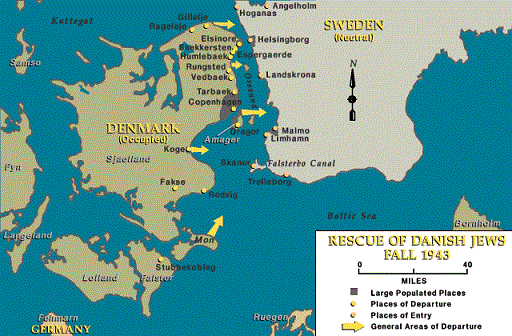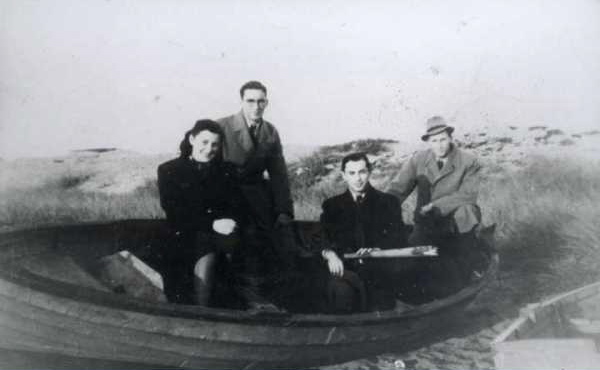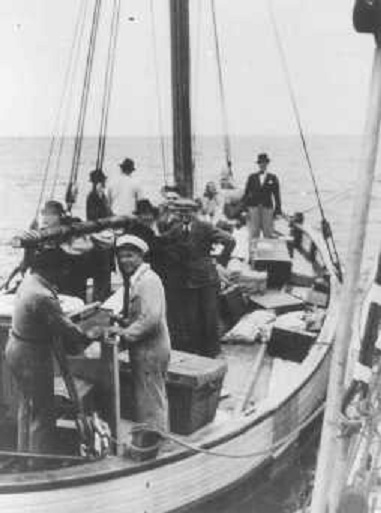This is the story of how the people of Denmark helped save thousands of Jews during Nazi occupation by hiding them or giving them help in escaping to Sweden. The events that happened in the fall of 1943 are wonderfully brought to life in the song "Denmark, 1943" by singer/songwriter Fred Small. In many of the countries occupied by Germany, the people stood by and watched their fellow countrymen be loaded onto cattlecars for deportation to the death camps. In Denmark, non-Jews stood by their Jewish friends in one of the greatest displays of courage in our history.
The Germans invaded Denmark in 1940 and the Danish did not resist. There were nearly 8000 Jews living in Denmark, most of them Danish citizens. Danes were supportive of the Jews and considered them their friends. Unlike other countries occupied by the Nazis, Danish Jews were spared the indignities of being forced to be relocate to the ghettos or being forced to wear yellow stars. The kinship between the Danes and the Jews would be tested severely as the Jewish new year approached in 1943.
And it's Eichmann and Himmler are turning the screws
The Fuhrer they say grows impatient
"How can it be Denmark's Jews still walk free
After three years of kind occupation?
We will take them like sheep in their beds as they sleep
On the second night of their new year
Devoutly at home they'll be helpless alone
When they cry out no one will hear"
In September the decision was made by Hitler to round up and deport the Danish Jews as part of The Final Solution. On September 28, a German diplomat Georg Ferdinand Duckwitz warned the non-Jewish Danes of the impending deportation of Jews. The non-Jewish Danes quickly spread the word and thus began one of the most amazing rescue operations in history.
Christian policemen, shopkeepers, and teachers
Tell their friends of the quickening storm
While students on bicycles race through the streets
Searching for Jews to be warned
And Katlev the foreman blurts out to the trainman
"My family has no place to hide"
"Well bring 'em to my house," the stranger replies
"And we'll spit in the damn Nazi's eyes"
A rescue operation was organized immediately led by non-Jewish Danes to find hiding places for the Jews and eventually to get them to the coast of Denmark. From there, dozens of fisherman ferried about 7200 Jews and 700 of their non-Jewish relatives across the Oresund sea to neutral Sweden.
Frozen with fright in the October night
Families huddle in basements and barns
Mistaking each breath for the angel of death
The Gestapo, the shot, the alarm
Then down into the hold with the stench and the cold
And drug all the babies with schnapps
Someone shouts, "Valkommen till Sverige
You are in Swedish waters at last"
When the Germans began their raid on October 1 they found only a few Jews. Nearly 95% of all the Jews living in Denmark escaped. Over 7000 people had to be hidden from the Nazis, transported to the Danish coast, then ferried across to Sweden in a few short days. The spirit of the Danish Jews and their non-Jewish friends is unprecedented to be able to pull this off.
Still 470 Jews were transported to Theresienstadt in Czechoslovakia. While not a death camp it was still a detention center, and the Danish Red Cross demanded information about the living conditions for their fellow Danes. The Red Cross pressured the Germans to allow inspections of Theresienstadt and to allow care packages to be delivered to the prisoners there. It's likely the Danes deterred the Germans from transporting the Danish Jews to the death camps in Poland.
When the war was over, the Danish Jews were welcomed back to their country where their homes and businesses were still intact. Danish authorities refused to allow the Germans or anyone to steal their possessions or destroy their homes.
Seven thousands of Jews smuggled over to Sweden
By fishermen, nurses, and priests
Hitler sends Eichmann to hunt them down
But his quarry have vanished like mist
When the war's over the Jews return
Cheers and flowers adorn their way home
"We're not heroes or martyrs," so say the Danes
"We were just looking after our own"
This is an incredible story about the human spirit. While many in other European countries occupied by the Nazis were all too happy to see their Jewish countrymen carted off in cattlecars to their certain death, the Danes risked their own lives to help rescue the Jews. It's not only a story of courage of the Danes, but it's also a story of how the Danes resisted the easy thing to do (which would be to do nothing) and went the extra mile to do what was clearly the right thing to do in saving their fellow countrymen. Fred Small also deserves all the credit in the world for writing and performing Denmark, 1943. I am still moved every time I hear it.










